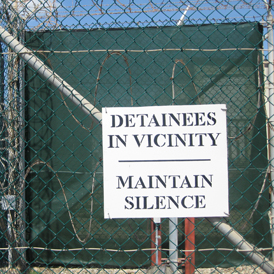Guantanamo Bay remains open 10 years on
Amnesty International calls on the US government to end indefinite detentions in Guantanamo, as the prison reaches its 10th anniversary.

In a new report, Guantanamo: A Decade of Damage to Human Rights, the charity said the treatment of Guantanamo detainees underlined reasons why the detention centre continued to represent an attack on human rights.
The charity said the failure to close the Cuba-based detention centre represented a “a toxic legacy for human rights”.
Of the 171 men still held at the camp, at least 12 were in the original group first transferred to Guantanamo on 11 January, 2002.
One of them is serving a life sentence after being convicted by a military commission in 2008 but none of the other 11 has been charged, the charity added.
Londoner Shaker Aamer, 43, is among them. He is originally from Saudi Arabia but is married to a British citizen and has four British children.
Channel 4 News reported on Mr Aamer’s hunger strike last September and his lawyers’ claims that he was routinely beaten on days his legal team was due to meet him.
It was also revealed that British former Guantanamo inmates donated a portion of payments they received from the government on their repatriation to the UK towards Mr Aamer’s legal costs.
Mr Aamer’s friend Moazzam Begg, as well as Binyam Mohamed, Bishar Al Rawi, Jamil El Banna, Richard Belmar, Omar Deghayes, and Martin Mubanga, are among the British residents and nationals who spent time in Guantanamo before being returned home.
Kate Allen, UK director for Amnesty International, said: “It’s an absolute disgrace that Shaker Aamer is still behind bars at Guantanamo – without a trial, without access to his family, almost without hope.
“Britain needs to put its foot down with the Americans. We know that the Foreign Secretary William Hague has already called for Shaker’s release. He should now insist on a specific timetable for this to happen – within days or weeks, not months or years.”